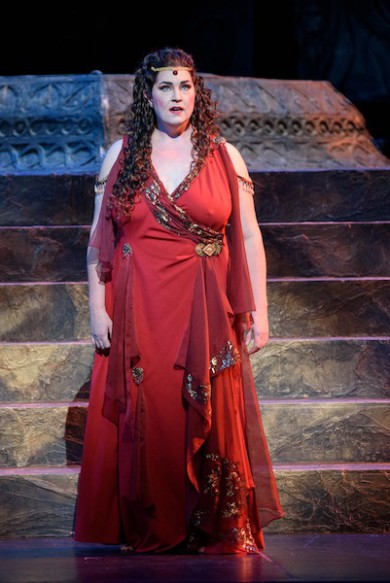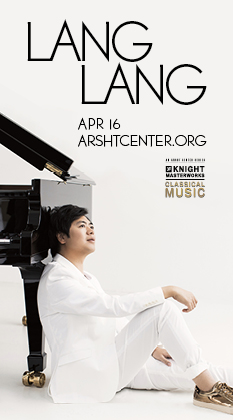A problematic princess dilutes impact of FGO’s dramatic “Salome”

Melody Moore performed the title role in Richard Strauss’s “Salome” Saturday night at Florida Grand Opera. Photo: Chris Kakol
Since its 1905 premiere in Dresden, Richard Strauss’s Salome has shocked and astounded audiences with its raw depiction of sexual obsession and madness. Based on Oscar Wilde’s play and its Biblical genesis, Strauss paints this Gothic tale in lushly chromatic musical strokes.
Florida Grand Opera’s first production of this blockbuster since 2003 opened Saturday night at the Arsht Center in Miami. And, despite a problematic anti-heroine in the title role, it still managed packed a musico-theatrical wallop.
The tale of King Herod’s passion for his stepdaughter Salome and hers for the imprisoned Jochanaan (John the Baptist) takes a dark turn after Jochanaan has condemned and rejected her. She demands the prophet’s severed head on a silver platter, in return for dancing for the patriarch, which leads to a grisly and violent results.
Director Bernard Uzan’s tense production vividly paints the characters and their desires with the dramatic pacing and explosive power of a psychological horror film. That cinematic quality extends to Boyd Ostroff’s handsome set (from Pittsburgh Opera). The exterior of Herod’s palace is dominated by huge pillars, steps leading to the cistern where the prophet is imprisoned and a large moon which turns blood red when Jochanaan is executed. Richard St. Clair’s array of multi-colored costumes and Kevin G Mynatt’s evocative lighting provide memorable images throughout the one-act opera’s hour-and-forty-minute length. Whether there is salvation for Salome at the conclusion, as Uzan has suggested, is very much in the eye of the beholder.
The ideal Salome requires the sexy appearance and playfulness of a young girl and a voice of Wagnerian proportions. Few singers totally fulfill either requirement, much less both. Melody Moore, who is singing the role for the first time, gives a workmanlike portrayal that does not succeed on either level.
She seemed dreamy and already beyond reality at her first entrance. Her unwieldy voice can turn wobbly and strident at the top. At times Moore utilizes her heavy vibrato effectively to color the text but her lower register did not always project over the orchestra. The soprano rose to the challenge of the lengthy final scene impressively. In Salome’s delirium, her voice took on a depth and color that were missing earlier with Strauss’ vocal lines given lyrical expanse. Moore even made the heroine’s grotesque infatuation with the lifeless prophet’s head believable. She spun the line “the mystery of love is greater than the mystery of death” with supple delicacy.
Unfortunately, Salome’s Dance of the Seven Veils, choreographed by Rosa Mercedes, was hardly that. Substantial of body, Moore is no dancer. Consequently, the dance was staged to be more suggestive than erotic, and only resulted in being awkward. The real work was done by the four female dancers who accompanied Moore’s veil removal. Alluring this dance was not.
The confrontation between Moore’s Salome and Jochanaan was no contest. Even when heard initially from the cistern, Mark Delavan’s baritone was commanding. As he emerged from the darkness, he initially appeared blinded by the light but his vivid declamation quickly conveyed the prophet’s fire and brimstone as he denounced Salome and the depravity of the court. In the more gentle passages, Delavan’s dark-hued timbre projected greater warmth and he dominated the stage with his every move and utterance.
As Herod, John Easterlin was no less impressive. A veteran character tenor, Easterlin could spin a lyrical line or rapidly declaim subtle wordplay. When he said “You are indeed your mother’s child” after giving in to Salome’s deadly request, Easterlin projected bitterness and fear. His artful portrait of Herod’s bipolar personality avoided the descent into caricature that sometimes plagues interpreters of the role.
The role of Salome’s mother Herodias is difficult to bring off. She spends most of her time onstage complaining about Jochanaan’s disrespect and encouraging Salome’s vicious impulses. Elizabeth Bishop managed to cut a proud, imperious figure and her impressive mezzo voice made the most of her pronouncements without appearing shrewish.
As Narraboth, the captain of Herod’s guard, Benjamin Werley (a member of the FGO young artist studio), displayed a strong stage presence and a powerful tenor with thrilling high notes.
Smaller roles were strongly cast. Mariya Kaganskaya showed a sizable mezzo as Herodias’s page, and Benjamin Dickerson and Simon Dyer as soldiers, and Rafael Porto and Orlando Valdes as Nazarenes made strong impressions in cameos.
Strauss’s orchestral writing is symphonic in scope. Conducting this opera for the first time, Timothy Myers vividly projected the score’s Middle Eastern coloring, drawing lush sonority from the excellent FGO orchestra. The big climaxes registered like thunderbolts. In Salome’s final monologue, Myers blended the vocal and instrumental textures masterfully, giving full measure to Strauss’s brilliant sonic palette.
Florida Grand Opera repeats Salome 2 p.m. Sunday and 8 p.m Tuesday, Friday and Saturday at the Arsht Center in Miami and 7: 30 p.m. February 8 and 10 at the Broward Center in Fort Lauderdale. Kirsten Chambers sings Salome on Sunday, Friday and February 10. fgo.org ; 800-741-1010.
Posted in Performances
4 Responses to “A problematic princess dilutes impact of FGO’s dramatic “Salome””
Leave a Comment
Sun Jan 28, 2018
at 11:26 am
4 Comments






Posted Jan 30, 2018 at 4:32 pm by Melody Moore
Sir,
There are no problems in any part of my voice or movement. Big girls can move beautifully. I am not awkward in any regard. While your opinion is valued by at least one person, it is not regarded by me or this company. Kirsten is abstunning friend and colleague and will be hurt by this clearly flaccid attempt at boring, separatist, competitive and mind-numbing “critical” rhetoric that you choose to smear on your public.
Posted Jan 30, 2018 at 5:44 pm by Vickie Johnson
“substantial of body” I hope this term is not meant to body shame a very talented singer and performer. “ Sexy” does not fit a mold. I am very disappointed to read this and you lost any respect for your commentary on any other part of the performance by using these words.
Posted Jan 30, 2018 at 5:49 pm by James McEuen
I thought that we were over completely subjective
“shape shaming” in the arts. Perhaps only heldentenors can be “substantial of body,” and what, may I ask, do you know about the “playfulness of a young girl”? I have heard Melody Moore, and she is a stunning performer. She is “substantial” in her art, her presence, her acting…her heart. This review is shameful.
Posted Jan 31, 2018 at 10:41 pm by Sonia Ruiz
Very accurate description of this opera.